Act 1
Faust, an aging professor, despairs that his life has been wasted, since his studies, and religious faith have not given him the answers he was looking for (Rien! En vain j'interroge). He prepares to kill himself with poison but hesitates in doubt. He curses science and faith, and asks for infernal guidance. Méphistophélès appears (duet: Me voice) and, with a tempting image of young Marguerite at her looking glass, he persuades Faust to buy Méphistophélès's services on earth in exchange for Faust's in Hell. Faust's glass of poison becomes an elixir of youth, making the middle-aged doctor feel young; the strange companions then set out into the world.
Act 2
A chorus of academics, soldiers and students sing a drinking song (Vin ou Bière). Valentin, Marguerite’s brother, is soon leaving for war and he entrusts the care of his sister to her friend Siébel (O sainte médaille ... Avant de quitter ces lieux). Méphistophélès appears and sings a rousing, irreverent song about the Golden Calf (Le veau d'or) and after, provides the uneasy crowdwine. Méphistophélès maligns Marguerite, and Valentin tries to strike him with his sword, which shatters in the air. Valentin uses the cross-shaped hilt of his sword to fend off what they now fear is an infernal power (chorus: De l'enfer). Méphistophélès is joined by Faust and the young girls in a waltz (Ainsi que la brise légère). Marguerite appears briefly and Faust attempts to charm her, but she refuses his offer to walk her home out of modesty.
Act 3
Siébel leaves a bouquet for Marguerite (Faites-lui mes aveux). Méphistophélès insists in searching for a more tempting gift for Marguerite and Faust sings a cavatina (Salut, demeure chaste et pure) idealizing Marguerite as a pure child of nature. Méphistophélès returns with a beautiful box containing exquisite jewelry and Faust leaves it on Marguerite's doorstep, near Siébel's flowers. Marguerite enters, pondering her encounter with Faust, and sings a melancholy ballad about the King of Thulé (Il était un roi de Thulé). Marthe, Marguerite's neighbour, notices the jewelry and says it must be from an admirer. Marguerite tries on the jewels and is captivated by how they enhance her beauty, as she sings in the famous aria, the Jewel Song (Ah! je ris de me voir si belle en ce miroir). Méphistophélès and Faust join the women, Mephistopheles distracts Marthe and leaves Faust to seduce Marguerite. Marguerite eventually allows Faust to kiss her (Laisse-moi, laisse-moi contempler ton visage), but then in panic demands he goes away. She sings at her window of her interest in him, and Faust, listening, returns. Under the watchful eye and malevolent laughter of Méphistophélès, it is clear that Faust's seduction of young Marguerite is achieved.
Act 4
After being impregnated and abandoned by Faust, Marguerite is a social outcast. She is alone in her room (Il ne revient pas). Siébel visits and stands by her. Marguerite goes to the church and tries to pray there but is frightened, first by Méphistophélès and then by a choir of demons. She finishes her prayer but faints when she is cursed again by Méphistophélès. The scene shifts to the return of the soldiers - Valentin's company returns from the war to a military march (Deposons les armes and Gloire immortelle de nos aïeux). Siébel tries to keep Valentin from Marguerite as she is afraid he will punish her, but after looking for her in the church he returns to Marguerites room and breaks in. While he is inside Faust and Méphistophélès appear, and Méphistophélès sings her a mocking burlesque of a lover's serenade (Vous qui faites l'endormie). Valentin emerges from her room, furious at what has happened to Marguerite and suspecting that it is Faust who has debauched his sister. The men fight, Méphistophélès blocking Valentin's sword, allowing Faust to make the fatal thrust. With his dying breath Valentin blames Marguerite for his death and condemns her to Hell (Ecoute-moi bien Marguerite).
Act 5
Méphistophélès and Faust return to visit Marguerite. Outside is Siebel, asleep, guarding her friend. Faust retrieves the key from the sleeping figure and enters Marguerite’s room. He sees she is in a terrible state, bleeding and pale, and may die. He and Marguerite sing a love duet (Oui, c'est toi que j'aime). Méphistophélès states that only Faust can deliver Marguerite from her fate, and he tries to help her, but she prefers to trust her fate to God and His angels (Anges purs, anges radieux). At the end she asks why Faust's hands are covered in her blood, pushes him away, and collapses. Méphistophélès curses, as a voice on high sings "Sauvée!" ("Saved!"). The bells of Easter sound and a chorus of angels sings "Christ est ressuscité!" ('"Christ is risen!"). And Marguerite's soul rises to heaven. In despair Faust follows it with his eyes; he falls to his knees and prays.
Isabella Bywater
Place: Germany
Time: 16th century
Act 1
Faust's cabinet
Faust, an aging scholar, determines that his studies have come to nothing and have only caused him to miss out on life and love (Rien! En vain j'interroge). He attempts to kill himself (twice) with poison but stops each time when he hears a choir. He curses hope and faith, and asks for infernal guidance. Méphistophélès appears (duet: Me voici) and, with a tempting image of Marguerite at her spinning wheel, persuades Faust to buy Méphistophélès's services on earth in exchange for Faust's in Hell. Faust's goblet of poison is magically transformed into an elixir of youth, making the aged doctor a handsome young gentleman; the strange companions then set out into the world.
Act 2
At the city gates
A chorus of students, soldiers and villagers sings a drinking song (Vin ou Bière). Valentin, leaving for war with his friend Wagner, entrusts the care of his sister Marguerite to his youthful friend Siébel (O sainte médaille ... Avant de quitter ces lieux). Méphistophélès appears, provides the crowd with wine, and sings a rousing, irreverent song about the Golden Calf (Le veau d'or). Méphistophélès maligns Marguerite, and Valentin tries to strike him with his sword, which shatters in the air. Valentin and friends use the cross-shaped hilts of their swords to fend off what they now know is an infernal power (chorus: De l'enfer). Méphistophélès is joined by Faust and the villagers in a waltz (Ainsi que la brise légère). Marguerite appears and Faust declares his admiration, but she refuses Faust's arm out of modesty, a quality that makes him love her even more.
Act 3
Marguerite's garden
The lovesick boy Siébel leaves a bouquet for Marguerite (Faites-lui mes aveux). Faust sends Méphistophélès in search of a gift for Marguerite and sings a cavatina (Salut, demeure chaste et pure) idealizing Marguerite as a pure child of nature. Méphistophélès brings in a decorated box containing exquisite jewelry and a hand mirror and leaves it on Marguerite's doorstep, next to Siébel's flowers. Marguerite enters, pondering her encounter with Faust at the city gates, and sings a melancholy ballad about the King of Thule (Il était un roi de Thulé). Marthe, Marguerite's neighbour, notices the jewellery and says it must be from an admirer. Marguerite tries on the jewels and is captivated by how they enhance her beauty, as she sings in the famous aria, the Jewel Song (Ah! je ris de me voir si belle en ce miroir). Méphistophélès and Faust join the women in the garden and romance them. Marguerite allows Faust to kiss her (Laisse-moi, laisse-moi contempler ton visage), but then asks him to go away. She sings at her window for his quick return, and Faust, listening, returns to her. Under the watchful eye and malevolent laughter of Méphistophélès, it is clear that Faust's seduction of Marguerite will be successful.
Act 4
Marguerite's room / A public square outside her house / A cathedral
[Note: The scenes of acts 4 and 5 are sometimes given in a different order and portions are sometimes shortened or cut in performance.]
After being made pregnant and seemingly abandoned by Faust, Marguerite has given birth and is a social outcast. She sings an aria at her spinning wheel (Il ne revient pas). Siébel stands by her. The scene shifts to the square outside Marguerite's house. Valentin's company returns from the war to a military march (Deposons les armes and Gloire immortelle de nos aïeux, the well-known "soldiers' chorus"). Siébel asks Valentin to forgive Marguerite. Valentin rushes to her cottage. While he is inside Faust and Méphistophélès appear, and Méphistophélès, knowing that Marguerite is not in there alone, sings a mocking burlesque of a lover's serenade under Marguerite's window (Vous qui faites l'endormie). Valentin takes the bait and comes out of the cottage, now knowing that Faust has debauched his sister. The two men fight, but Faust is reluctant to hurt the brother of the woman he adores. Méphistophélès blocks Valentin's sword, allowing Faust to make the fatal thrust. With his dying breath Valentin blames Marguerite for his death and condemns her to Hell before the assembled townspeople (Ecoute-moi bien Marguerite). Marguerite goes to the church and tries to pray there but is stopped, first by the sadistic Méphistophélès and then by a choir of devils. She finishes her prayer but faints when she is cursed again by Méphistophélès.
Act 5
The Harz mountains on Walpurgis Night / A cavern / The interior of a prison
Méphistophélès and Faust are surrounded by witches (Un, deux et trois). Faust is transported to a cave of queens and courtesans, and Méphistophélès promises to provide Faust with the love of the greatest and most beautiful women in history. An orgiastic ballet suggests the revelry that continues throughout the night. As dawn approaches, Faust sees a vision of Marguerite and calls for her. Méphistophélès helps Faust enter the prison where Marguerite is being held for killing her child. They sing a love duet (Oui, c'est toi que j'aime). Méphistophélès states that only a mortal hand can deliver Marguerite from her fate, and Faust offers to rescue her from the hangman, but she prefers to trust her fate to God and His angels (Anges purs, anges radieux). At the end she asks why Faust's hands are covered in blood, pushes him away, and falls down motionless. Méphistophélès curses, as a voice on high sings "Sauvée!" ("Saved!"). The bells of Easter sound and a chorus of angels sings "Christ est ressuscité!" ('"Christ is risen!"). The walls of the prison open, and Marguerite's soul rises to heaven. In despair Faust follows it with his eyes; he falls to his knees and prays. Méphistophélès is turned away by the shining sword of the archangel.


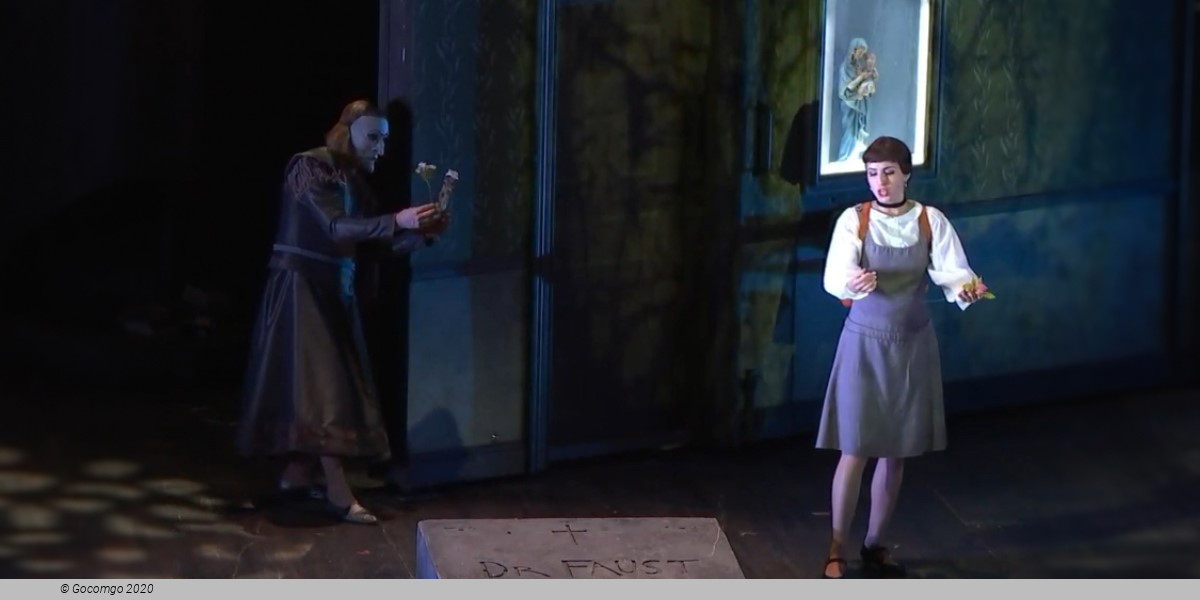
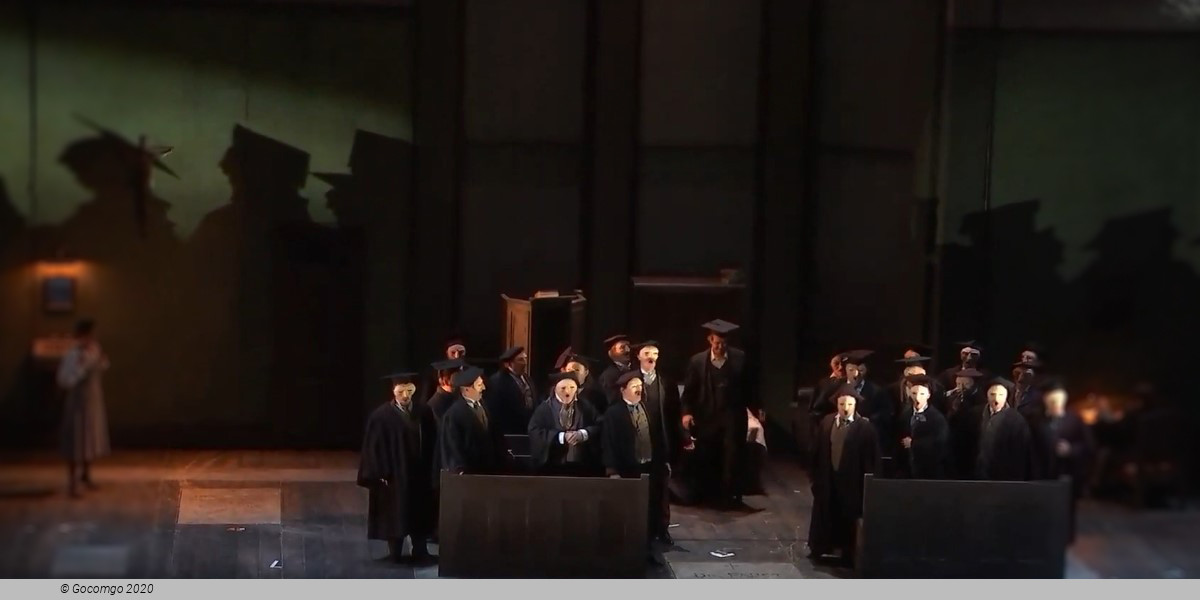
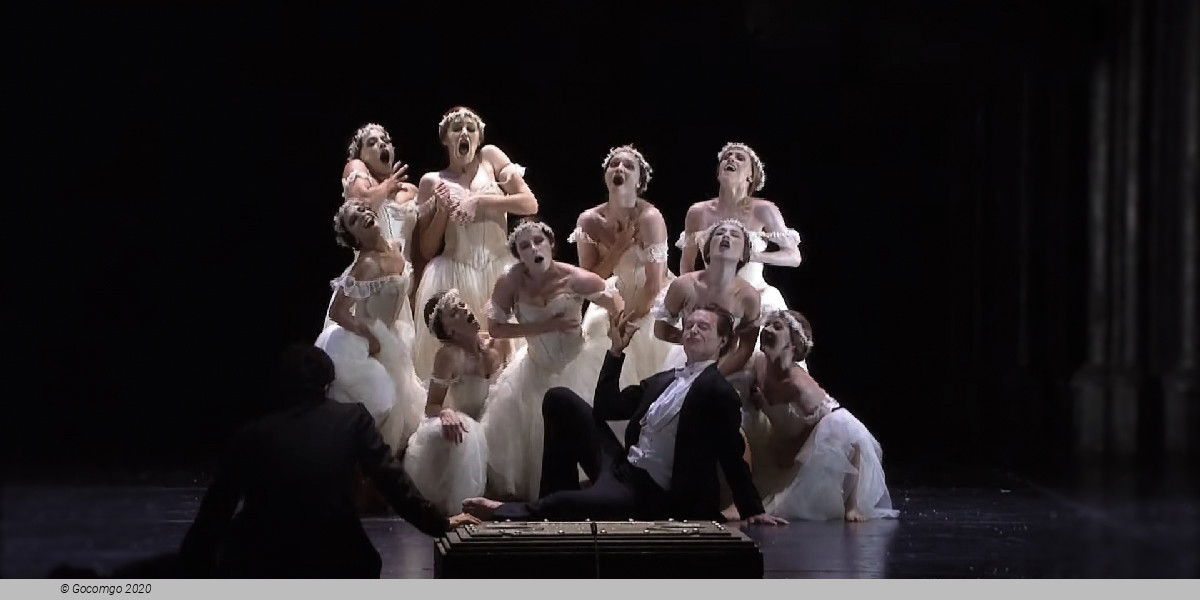
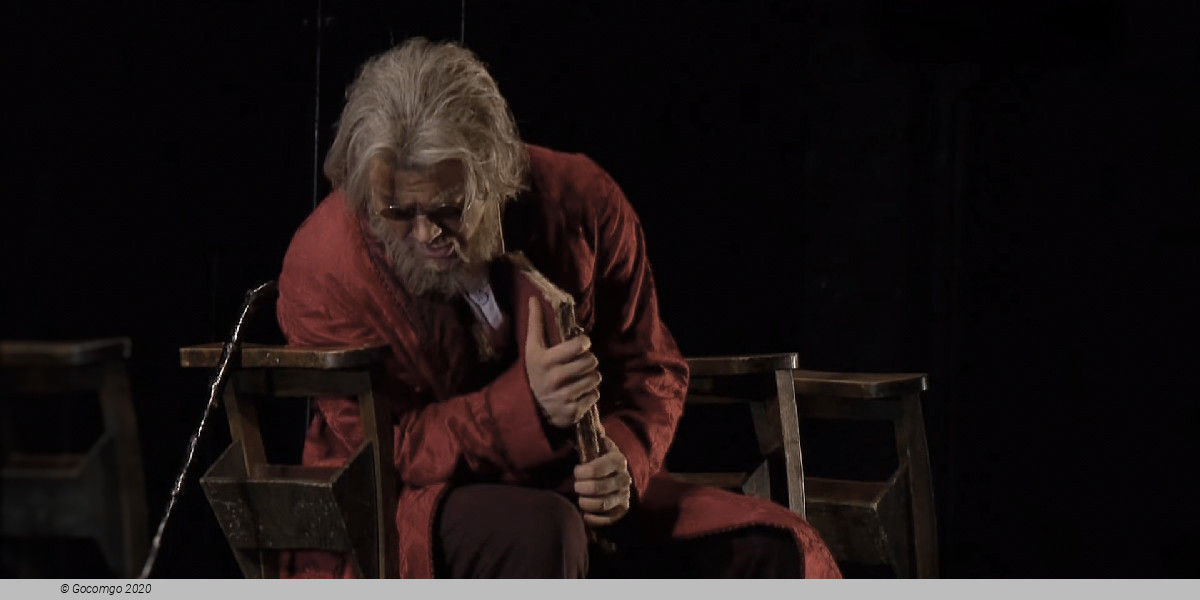
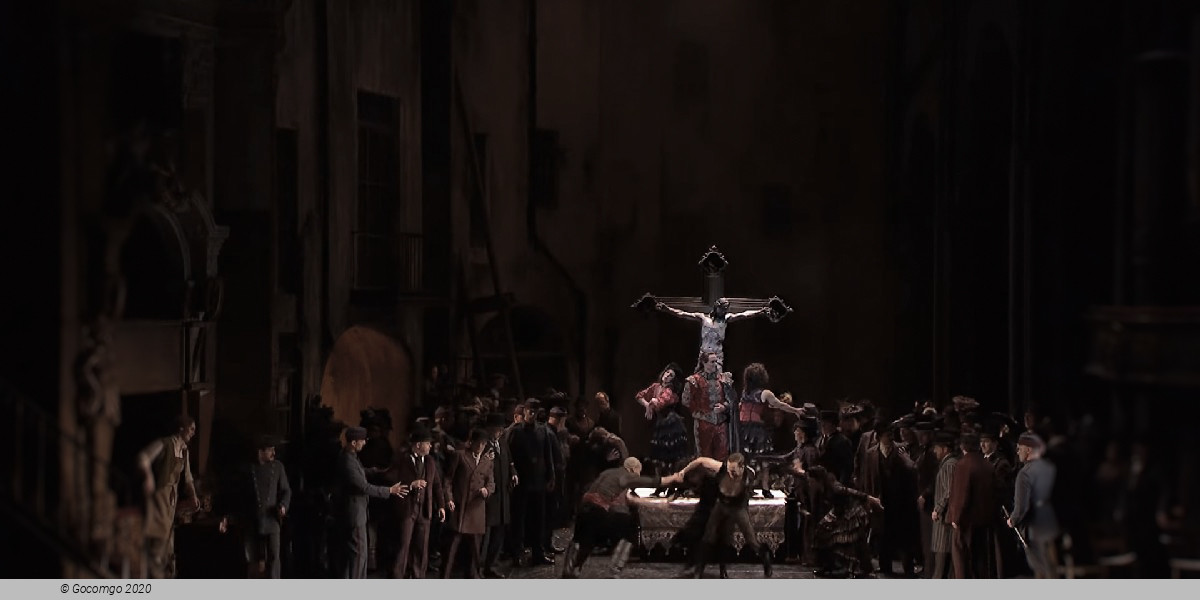
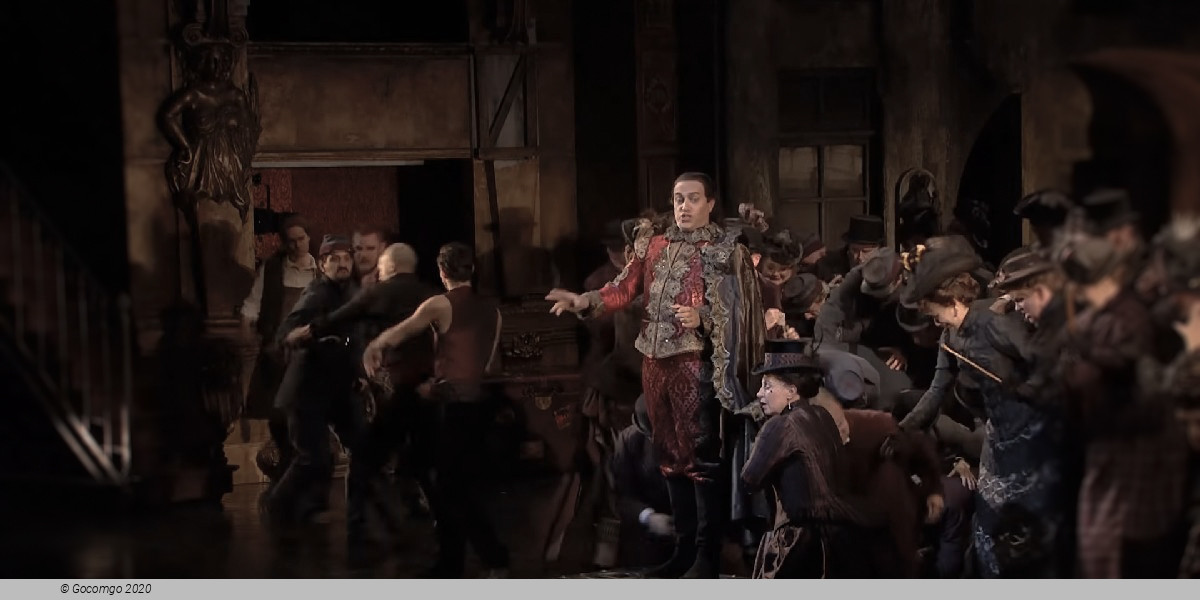
 1 Theatre Square
1 Theatre Square